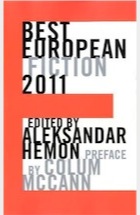 |
| via |
I bought this book while browsing Borders, where I seldom shop, because the words "best", "Europe", and "fiction" get me all hot and bothered. I bought it new, which means I was really hot and bothered (and on vacation). I couldn't even wait to browse Amazon's used books! That's pretty much the source of all my books. Suffice it to say, my initial expectations were unusually high. I wanted this to be the best book I had read all year. I wanted it to blow my mind. I wanted to cry or sit in amazement or feel like existentialism was being ripped at the seams. I wanted epic.
I have to say that I did not feel like existentialism was ripped at the seams. That is way too epic and easily considered going overboard. With that being said, this collection is epic (shall I continue to abuse this word?). I haven't read any of Hemon's own novels, but he's one hell of an editor. The book is an anthology of short fiction from the various nations of Europe in their languages, which meant some had several stories. The breadth of style, topic, and form was so varied that the pieces were barely held together by the idea of Europe. The preface by Colum McCann is key to the anthology and its significance. McCann ties together the European identity crisis with the idea that binds this anthology:
Perhaps the term "European" is increasingly effective because of its inherent slipperiness. In eluding definition, it embraces the shifting nature of contemporary identity, this refusal to be bordered…Reality outruns definition. There is no real sense––not yet at least––of anyone wanting to draw attention to the "great European novel" in the same sense that the world anticipates, rightly of wrongly, the "great American novel," but that might be because there is still no final lockdown on what "European" actually means.The European identity is something that's even been discussed in the political realm as the EU is facing separatist tendencies during rough times. The nebulous nature of that idea is what provides fodder for new ideas, both politically and artistically. It could lead to the break of the EU, but the idea is the little piece of grit in Europe's mouth. Will it create a pearl or a mouth sore? As McCann writes in a final flourish,
Yeats said that of our conflicts with ourselves we make poetry. True enough. And, if so, of our conflicts with others, we make countries. So, by extension, of our conflict with countries, we again make ourselves. Hence the page and the words thrown against it.I won't elaborate much more on this point because I've discussed this repeatedly, but it is a basic and complicated part of modern Europe. The anthology continues in this thread and provides an artistic lens. Oh yeah, and lots of really great fiction regardless of the context in which they're published.
Some of the pieces weren't even set in Europe. Similar to the anthology Descriptions of a Struggle, the collection showcases the variety of talent that resides in Europe. Interestingly, Turkey was included though I remain unclear as to whether Turkey is accepted as European. I'm glad it was because Ersan Üldes's "Professional Behavior" was an incredible meta-story of a translator that adjusts the novels he translates. It is especially poignant given that almost all of the stories are translated from their original language. The theme reminded me of the Péter Nádas story "Vivisection", which is unbelievably smart.
Drago Jančar of Slovenia wrote "The Prophecy", which stuck in my mind most particularly because of the rich symbolic value. A simple act of defiance in the Yugoslavian barracks unravels into an elaborate act of individualism replete with metaphors. Zurab Lezhava of Georgia wrote the wonderful piece "Sex for Fridge" that explores the utilitarianism of objects and the sentimentality attached even to a piece of junk. Alex Popov of Bulgaria wrote "Plumbers", set in Germany where plumbers are in fact government-sponsored gigolos meant to improve the happiness of wives and satisfaction in marriage. (I have read several Bulgarian pieces that revolve around the role of sex in society; is there any cultural background for this?) The plumbers are migrant workers, trying to send money home. It strongly ties in with the FEMEN idea of Eastern European becoming a brothel, but it reverses expectations by placing men as the sex workers who voluntarily join the trade. Victor Martinovich of Belarus wrote "Taboo", which I loved for its imaginative exaggeration of the state's role in protecting objects of cultural value, leading to untimely deaths.
I loved most of the stories, the featured ones more than others, but it is so rich and full of good fiction that there's something for those who are more intellectual or who simply want to be amused. I can't wait for the next edition and may even buy the 2010 anthology. I am glowing about this book. I almost want to cradle it in my arms when I dream so that I will dream of Europe by osmosis. Tonight I'll try it out and see how it works. Maybe I'll end up dreaming about male sex workers and Communist fridges.
